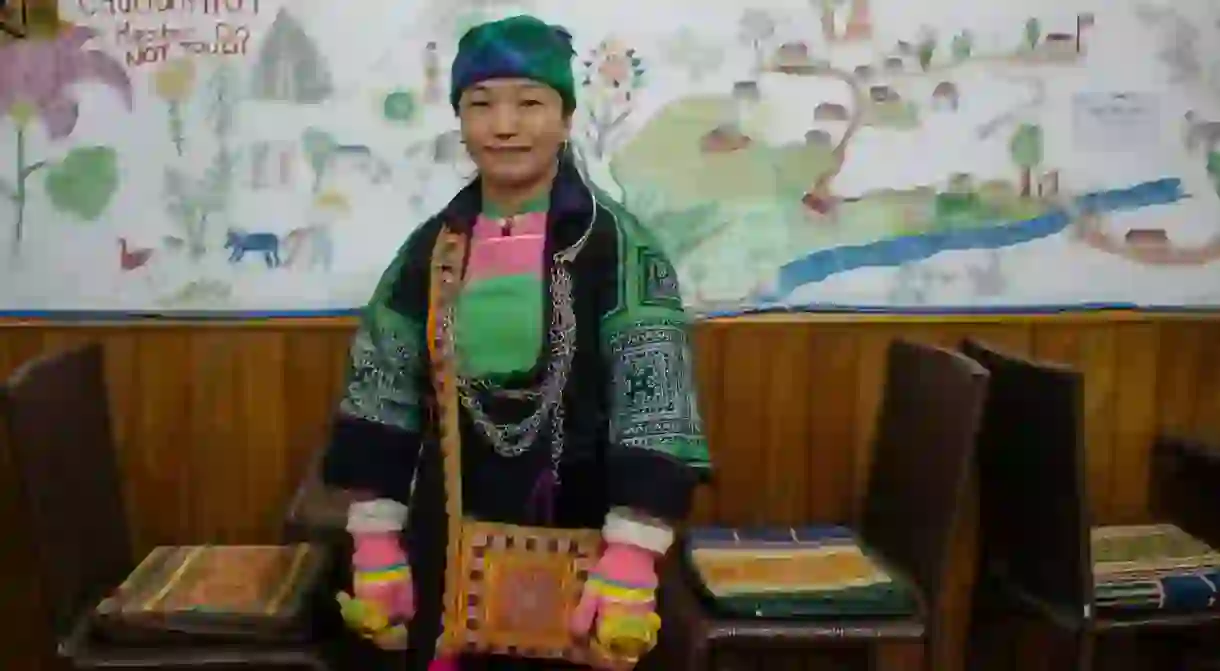A Day in The Life of a H'Mong Tour Guide in Sapa, Vietnam

Sapa is one of the most stunning places to visit in Vietnam, making it among the country’s top destinations for tourists. Lying at the base of the Himalayas in northwestern Vietnam, Sapa inhabitants (mostly ethnic minorities such as the Dao and H’Mong peoples) have developed strong community-based tour operations that see every dollar made from treks and homestays funneled back into the community.
A brief history of the misty city
The first residents of Sapa are virtually unknown, disappearing without a trace except for hundreds of petroglyphs – circular carvings into stone that are displayed throughout the valley today. Historians estimate that ethnic groups, such as the H’Mong who make up the majority of Sapa inhabitants, began to arrive from China sometime in the 15th-century. Today, many H’Mong earn money by sharing their culture with the tourists increasingly present in their beautiful land.
Without further ado, meet Mrs. Co (Cở), a H’Mong woman and tour guide guide in cool, misty Sapa.

Life as a H’Mong tour guide
Mrs. Co was born in 1985 and married her husband at just 17-years-old. She’s a proud mother of two teenage children, a son and a daughter. Before she became a tour guide in Sapa, Mrs. Co sold souvenirs to tourists in her home village. She tells us that she was not good at product marketing and between that and falling ill several times between the births of her two children, she decided to stop selling souvenirs and instead look for a new job with Sapa O’Chau.

Sapa O’Chau is a company that arranges treks and homestays with the local Dao and H’Mong people. Their website explains that they are “an award-winning social enterprise organising authentic, responsible treks and homestays in Sapa, Vietnam”. The proceeds directly support ethnic minorities living in the region. Sapa O’Chau was founded by Tan Thi Su, whose accomplishments led her to be featured in the 30 Under 30 list by Forbes Vietnam in 2016.

It’s a typically foggy day in Sapa’s winter months as Mrs. Co tells us about herself. After accepting a job with Sapa O’Chau, Mrs. Co found quick success as a tour guide. She speaks excellent English but admits she can’t read or write, so she is learning how to write in her spare time. When asked what she enjoys most about her job, she replies that she really loves talking to tourists and learning about different cultures around the world.

Mrs. Co explains that the H’Mong people have higher standards of living in Sapa as opposed to neighbouring villages. Tourism provides the Sapa H’Mong with a terrific source of income, and she is always pleased to share her culture with eager visitors.

Bundled in her colourful, traditional clothes (and some adorable mittens), Mrs. Co tells us that what she loves most about her home in Sapa is the weather and the landscape. During our talk, winter fog gently blankets the city in a cool, refreshing mist, while the sun later reveals terraced rice fields adorning the mountain slopes flanking the city.

As any seasoned traveler knows, the benefits of a local tour guide is priceless. No one knows an area like a local, and no one can more accurately describe a culture than someone born from it. Mrs. Co agrees, and says that a local tour guide can provide deep insight into local customs and habits, forming a bridge between tourists and local people.



Sapa, like every other city discovered by tourists, has steadily been growing to accommodate the travelers. Mrs. Co has seen many changes; she recalls that in the last two to three years, several new hotels have been built and she hopes the new construction will be limited to Sapa’s center and not in the surrounding villages. She wants tourists to experience nature and life in the villages with adventures, authenticity, and traditions.

Mrs. Co notes that the majority of her tourists come from England, the U.S., New Zealand, Australia, Spain and Italy, with more arriving each year.

As for what she hopes tourists gain from their stay at Sapa, she wants them to experience the “changes of the beautiful landscapes through seasons, and traditional cultural values of local minorities”.
To book a trek with Sapa O’Chau, visit their website.














